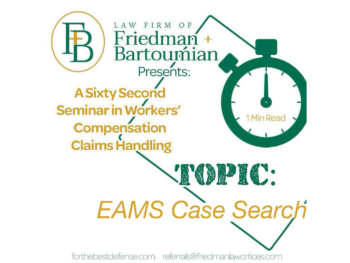In today’s world of workers’ compensation, it is a most welcome and common occurrence for nurses to be engaged to assist and participate in the adjustment of industrial claims; however, most claims professionals are unaware there are six (6) different types of nurses available in workers’ compensation, each of which has a different but vital role. In today’s blog we will discuss the six different roles a nurse may perform in any given industrial claim.
- Telephonic Nurse Case Management: This is where the nurse performs all functions of case management but does so exclusively via telephone. Their duties include contact with injured workers, physicians and sometimes employers. In addition, the nurse schedules all tests, therapy appointment and other services required, all from telephonic or computer communication.
- Field Nurse Case Management: This type of assignment requires the nurse to travel to meet the injured worker, attend medical evaluations, including hospital visitation, speak directly to physicians and scheduling medical appointments either in person or by telephone.
- Task Nurse Assignment: This type of nurse is hired to complete one task only. Often it involves having a nurse attend an appointment with the injured worker when being examined by the primary treating physician. The nurse often asks the PTP to address MMI or RTW status. We generally see this occur when a PTP fails to respond to inquiries from a claim professional, thus necessitating a personal visit from a nurse to solicit a response.
- Utilization Review Nursing Assignment: Many insurance companies and TPAs hire nurses solely to address dozens of RFAs that arrive daily. A UR nurse is a gatekeeper. If the RFA requests a procedure or medication that should be authorized by UR, then the nurse will issue approval. On the other hand, if the request is for something that may need modification or denial then the nurse will forward the request to the UR physician for response.
- Record Review Nursing Assignment: At times subpoenaed records can be voluminous consisting of hundreds, if not thousands of pages. An attorney or claims administrator may not have the time or expertise to review all the records to locate information about important past medical issues. A nurse may be hired to spend time reviewing past records and to note anything of importance impacting the current claim.
- Nurse Consultant Assignment: A nurse may be hired to provide medical guidance to the claim administrator or defense attorney regarding certain unusual industrial injuries seldom seen. They act as a consultant to explain aspects of the injury to the injured worker and what they should expect in the future. Such information is usually helpful when establishing reserves or selecting an appropriate QME specialty. The nurse may also assist in deposition preparation by suggesting relevant medical questions to be explored during applicant’s depo.
Some claims administrators may employ over 50 nurses on their staff, handling the various issues identified above. Surprisingly, most nursing colleges do not provide information to their students about a career in claims administration nursing. Nurses usually learn about a career in workers’ compensation by word-of-mouth. If your claims organization needs nurses, we suggest contacting the career center at the local nursing college!



 LC 5710 Attorney Fees: A Sixty-Second Seminar in Workers’ Compensation Claims Handling
LC 5710 Attorney Fees: A Sixty-Second Seminar in Workers’ Compensation Claims Handling
Leave a Reply